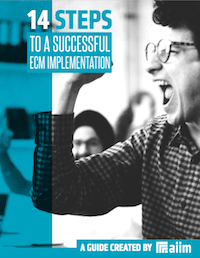The AIIM Blog
Keep your finger on the pulse of Intelligent Information Management with industry news, trends, and best practices.
Accounting and Finance | Automation
If there was ever an industry in need of automation, it would be the mortgage lending industry. This industry is plagued by time-consuming and error-prone, paper and labor-intensive processes, front-end systems that do not communicate efficiently with back-end systems, and third-parties that are often not integrated into the process electronically. These problems are exacerbated by the huge volume of loans that are generated each year (nearly 5 million new consumer mortgages alone). Content management is a key enabling technology in solving these problems.
Share
Intelligent Information Management (IIM)
Information is your most important asset; our goal at AIIM is to help you with the skills to manage it. With the new year fast-approaching, I thought it would be a good opportunity to provide you with 4 FREE assets to help you improve the way you manage information. The lessons in these resources will have you off to a great start in 2017! Add these to your reading list and stay at the top of your game.
Share

Making an ECM implementation successful requires planning and attention to detail. The best way to create the right solution is to identify organizational goals and priorities. Learn how to manage a successful implementation in our free guide.
Enterprise Content Management (ECM) | Intelligent Information Management (IIM)
Here are some articles that particularly inspired me during November that I think are worth your time reading.
Share
Intelligent Information Management (IIM)
And the envelope, please… Here are the ten most popular articles on The AIIM Blog for November. Interestingly, 2 of the 10 are more than 5 years old; proving that content does indeed have a long tail. Take a guess before clicking which two are the long tail – no cheating – and then, see if you’re right!
Share
Enterprise Content Management (ECM)
It’s the best of times for those in the content biz -- content has never been more important in creating and delivering value to customers. And it is also the worst of times – ECM is increasingly viewed as a dated and artificially narrow term, creating an untethered feel to the content “industry” right now.
Share
Accounting and Finance | Automation
According to the American Productivity and Quality Center, an amazing 74% of organizations are currently engaged in a finance process improvement initiative. Why are they doing this? And how does this tie to broader Digital Transformation initiatives?
Share